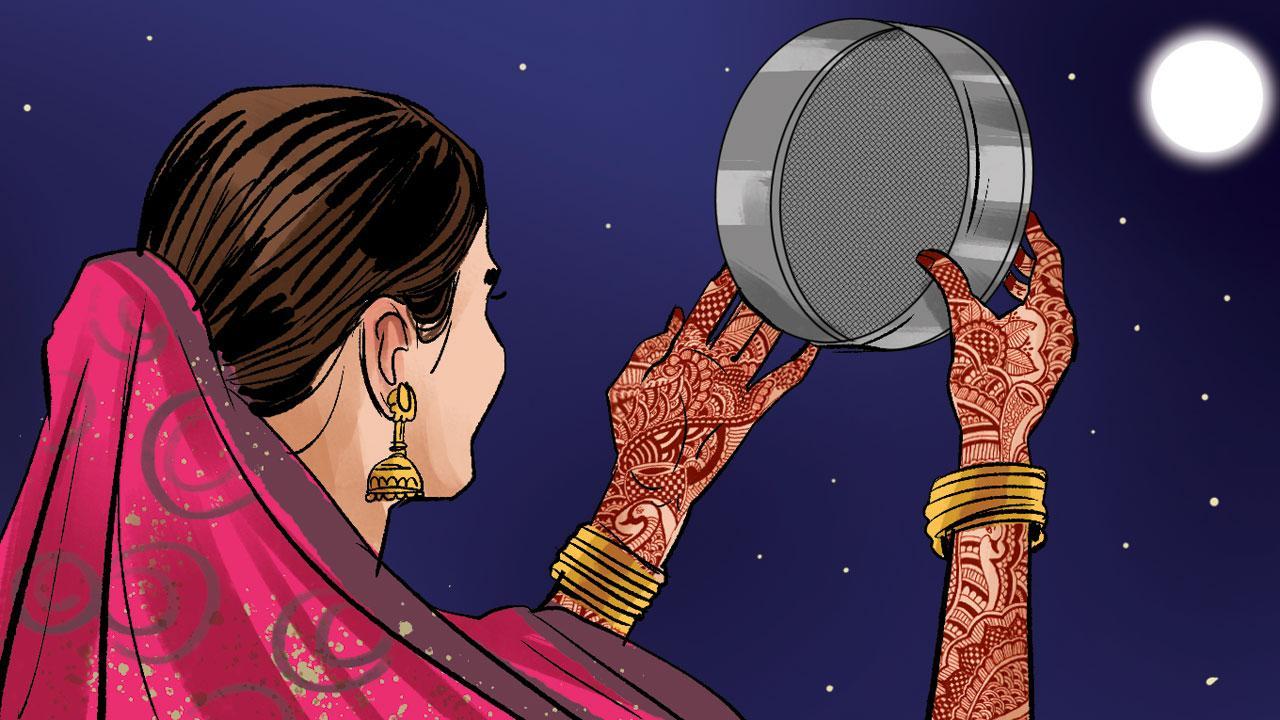Had tradition gamed technology, or had technology questioned tradition? Oh the moon of confusion, it casts a wondrous light

Illustration/Uday Mohite
![]() My friend, a teacher, received an email from her school with the subject line: biometric error due to henna. Employees punching in and out with hands covered in Karwa Chauth mehendi were confusing the scanners. Had tradition gamed technology, or had technology questioned tradition? Oh the moon of confusion, it casts a wondrous light.
My friend, a teacher, received an email from her school with the subject line: biometric error due to henna. Employees punching in and out with hands covered in Karwa Chauth mehendi were confusing the scanners. Had tradition gamed technology, or had technology questioned tradition? Oh the moon of confusion, it casts a wondrous light.
Little such confusion was to be obtained in online debate. Along with the ritual of fasting for Karwa Chauth, is the parallel digital ritual of objecting to Karwa Chauth. This debate keeps marriage centralised but also obscures a confusion in categories—not every married person wants to be married, and not every single woman wants to be unmarried. There may be hazaron khwaishein in the worlds, but in public debate, there are usually only two positions, kind of like in marriage.
The unwillingness to decentralise marriage and the inheritances of caste and property it comes bundled with are such, that society routinely shuffles to include more kinds of couples as a way to preserve matrimony, rather than unpack it. This is what the Dabur advertisement which featured a same-sex couple—two women of course—fasting for each other, dressing up together and viewing each other when the moon came out, rode on.
But looks like no one fasted for the long life of the Dabur advertisement because it had a very brief existence. Following objections from both, those who felt it was pink washing (it was) and a minister from Madhya Pradesh, who felt queer marriage was a slur on sanskar (far from it).
I asked my many queer colleagues, what they thought about the advertisement. They responded eloquently with ‘meh’. “If the advertisement were on television, where it might be watched in the middle of a traditional soap or Arnab shouting, where the whole family might end up seeing it together, then it has the potential to create some discussion. Dostana did that in my family, because we saw it together by chance. Sure it was ‘problematic’, but it definitely opened up the discussion for us.” For some, this happened via the Fast Track ad. For others through Dr Watsa’s column—an unexpected presence that confused the main narrative.
Once, advertisements were enjoyable—funny, unconventional, energetic—and so, they also had the power to influence us more, albeit in mixed ways, some stereotypes, some disruptions. Advertisements like the Dabur ad however, are made for digital circulation and are also dull with predictability. “Why would a queer person need that film when there are far more interesting, meaningful queer things to be found online,” said my colleague. Indeed, the primary purpose such films increasingly serve is to be the pooja ki thali in the traditional digital ritual of virtue signalling.
Critiques often hinge on purity, but perhaps what raises a question or counts as resistance, also has something to do with context. How oppressed a single woman feels by Karwa Chauth, might depend on her closeness to matrimonial pressure and being devalued for being single. I, for instance, don’t register the festival at all. And if you come from a fairly easy-going family, not fasting might not be all that radical an act. Symbols do matter, but may be the way they matter changes over time. For those seeking something that makes a difference to them, such films are long past their sell-by date.
Paromita Vohra is an award-winning Mumbai-based filmmaker, writer and curator working with fiction and non-fiction. Reach her at paromita.vohra@mid-day.com
 Subscribe today by clicking the link and stay updated with the latest news!" Click here!
Subscribe today by clicking the link and stay updated with the latest news!" Click here!








